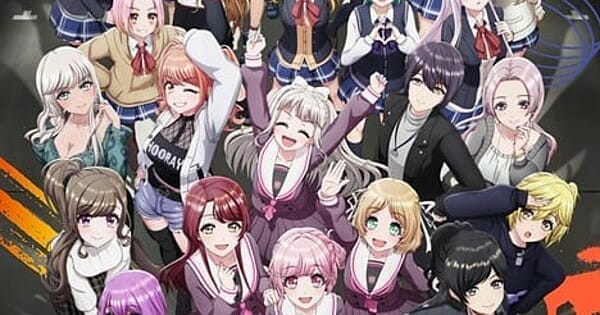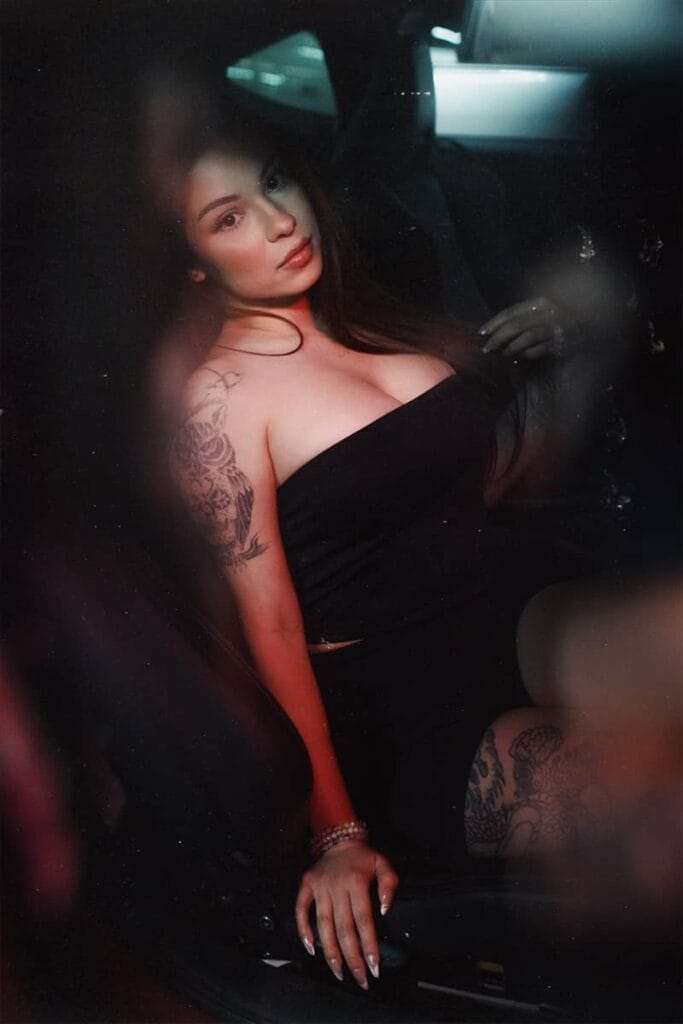
D4DJ All Combine
Right off rip, it’s apparent this assignment was handed down for D4DJ All Mix: Fully introduce all the DJ units who weren’t in the first season, and do…something with them. The original D4DJ First Mix functioned fine in following the formation of the central group Happy Around. Still, there are a whole bunch of other characters Bushiroad wants people rolling the gacha for; many of them have broken out to be more popular than Rinku and the gang. Even on a non-cynical level, it’s a natural escalation; D4DJ‘s population, with its myriad of characters in different groups, their pre-established connections and influences on each other, has always been a feature of its oddly DJ-centric world. Peaky P-key and Photon Maiden had their stories play out and intersect across Happy Around in the first season. Going bigger makes sense for a follow-up.
The anime even gives itself a head start with the bonus OVA D4DJ Double Mix. Crunchyroll uploaded this one the same day it premiered All Mix, under the same header as the series even. And Double Mix at first appears to be its own (however in-canon) feature, its event bringing together the groups of Merm4id and Rondo. But the spirit of that crossover continues to be a defining gimmick through All Mix, with development for both groups fully absorbing and referencing it by the end. Think of it like one of those bonus OVAs shows get after running, but this one you watch first. This second season’s Episode Zero, if you will.
What Double Mix doesn’t fit into, however, is the overall structure of All Mix, in its year-spanning, month-by-month procession of performances by rotating groups. And therein, we also encounter the biggest shift from how the freshman D4DJ played its progression and tone. There’s no arc to watching the assembly and accomplishments of these groups the way we did Happy Around through First Mix; all the units here are fully formed, with varying degrees of professional success. The DJ contest, which served as an endpoint of the first season (as well as a central feature of the mobile game’s stories), is also irrelevant here. Everyone is aligned under the singularly charitable goal of the town revitalization committee, marking everything in All Mix as decidedly more collaborative than competitive this time.
D4DJ First Mix succeeded thanks to its present but tempered stakes. The characters had goals they strove towards and even stumbled in trying to achieve at times. Still, it never tried to push these teenage DJ competition rivalries as anything more than good-natured, fulfilling competition. Rather than trying for any potential escalation, All Mix rolls the vibes back even further. With the focus on following only one or two groups over a month at a time, the tone recedes to something practically akin to a slice-of-life anime, doing its best to elucidate on the marketable personalities and gimmicks of these girls as best they can before capping almost every episode off with a brand-new single.
It means your enjoyment of each episode will be an independent experience informed by your preference for each group and the strength of a given story. While technically the new focal unit, Catholic quartet Lyrical Lily acts more as hosts than main characters throughout this season. Their devoted developmental time in episodes comes off as the most shallow. Appreciably, it’s Photon Maiden, who felt the least developed out of the groups who appeared in the first season, who seem to come out best in this second round. Their gradual development into wanting to present their own image and music style out of the shadow of their production company feels comfortable and earnest within the time they get to enact it, even though the managerial change-over that prompted this direction did happen off-screen within the anime and is only alluded to.
The other groups, given their turns, fared more unevenly. Part of the problem is that a central tenet of the plots for each group involves their wanting to grow and evolve beyond their established playing style. But since anime audiences barely got to know half these people this season, that supposed shift is irrelevant and often barely communicated. Photon Maiden’s cutesy glow-up works because we had a season and chance of hearing their previously polished spacey studio styles. That’s less relevant for someone like Merm4id, where every song they get this season is a tie-up with some other in-universe artist. Thus it falls to the episodes themselves to be entertaining affairs on their own, to similarly mixed results. There are highlights, like Merm4id’s story of DJ Saori struggling under expectations and English language barriers. And speaking of the previous main characters, Happy Around turns in probably the most entertainingly unhinged episode of the season, centered around the gimmick of Maho’s seiyuu Karin Kagami‘s English-speaking ability. Honestly, she sounds even better here than in the full English dub of First Mix.
Everything in between is differing degrees of fluff, with quality determined by how many of your faves are on-screen at the time. The presentation therein is mostly reliable. Seiji Mizushima stepping back into the Chief Director role to let Daisuke Suzuki handle regular directorial duties does seem to have rendered D4DJ a bit more low-key than before. Or that could result from ballooning the on-screen cast to twice the size. Still, you’re generally never far from an expressive sequence like Noa’s determined declaration of how cute all her bandmates are. SANZIGEN continues to put out the satisfactory standard for 3D CGI anime. You know that the face game is still outstanding. And for the mass of musical sequences this season is dedicated to delivering, most are entertaining to behold, even as they still blur the line between a DJ show and a typical anime idol performance. Stuff like the star-filled joint performance by Lyrical Lily and Photon Maiden stands out. Of course, we are still saddled with the most persistent problem of these Bushiroad musical multimedia joints. Say it with me, folks: No song subtitles.
While D4DJ is corporatized, that doesn’t mean it’s entirely cynical. Some of the most engaging indulgences come in moments like Rinku getting to play her little conch-music soundboard in the final show. There’s an adorable love for performing demonstrated apart from the series’ disinterest in the actual mechanics of music mixing. However, this season does include a few more references to production elements like sketches and demos. Still, it all can’t help but feel like a simple sideshow to where the wider franchise has wound up since the anime’s debut season. Those who have kept up with playing D4DJ Groovy Mix and experienced its unfolding event stories know that the ambition therein can be just a bit denser than what’s on display in this season. Not that Groovy Mix is exceptionally deep, but particularly in its most recent spate of stories, it’s approached topics like the perceived ethics of remixing others’ songs without their permission or harassment in the entertainment industry. Directly adapting such mobile game stories would be inadvisable (Bushiroad has attempted that in points over in BanG Dream! to decidedly mixed results), but going the other direction with All Mix still leaves the results feeling just that much more shallow.
The fact is that the mobile game that All Mix exists in service of promoting is the very reason the anime can’t outstrip the game’s ambition. Despite its far-reaching year-long arc structure, the anime is still positioned in the margins of the more high-stakes competitions and major character shifts covered for the broader franchise. This is what leaves All Mix with no choice but to feel more like a smaller-scale side story, albeit a perfectly fun, entertaining one, than a true successor to what D4DJ First Mix managed. In that respect, there’s a layered irony to my initial perception that the Double Mix OVA was disposable to the All Mix experience. As not only do the events of that one wind up fully integrated into the narrative and themes of All Mix by the end of it, but both the OVA and this season of anime are united in feeling like mere bonus tracks to the greater D4DJ album they’re here to sell you on. That’s a further irony: Both those who get sold on checking out the game by watching this anime and established fans who come back to this anime for more D4DJ action will come away feeling like it could have been so much more.


